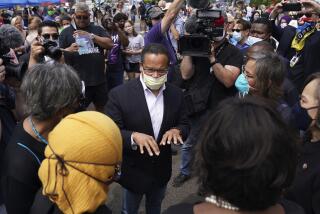Action, Not Study, on Racism : The problems are evident: Let’s get to work
- Share via
After months of divisive rhetoric from our political leaders about immigrants and affirmative action, after the verdicts in the O. J. Simpson trial and this week’s “Million Man March,” it comes as no surprise that long-simmering racial and ethnic tensions are again major national concerns. So a proposal by six congressional members for a national commission on race relations sounds good on the surface. The bipartisan group, made up of whites and blacks, says such a panel “may lead to a healthy discussion and a new era of progress between the races, both of which this country desperately needs.”
There is no question this country does need that discussion and that progress. But we fear a commission of the sort suggested would offer little gain; instead, it probably would report--with much fanfare--what we already know: For example, that the economic divide between blacks and whites is large; the poverty rate among blacks is more than twice that of whites; Latinos, expected to soon become the nation’s largest minority group, still face discrimination, as do others. Many good studies have already documented all of this.
THE LAWS ARE THERE: A commission on racial and ethnic relations undoubtedly would call for changes that in many cases already are in progress. Strong laws have helped to foster equality in key areas and encourage integration; indeed, much of the advance that has occurred is due to these laws. Fair housing laws, for instance, give every American who has the means the right to rent or purchase housing without regard to race, ethnicity or religion. Those laws, on the books since 1968, facilitate residential and social integration. Similarly, affirmative action programs that provide all qualified applicants a fair chance at jobs have a proven record of promoting understanding by providing a means by which people of all races and backgrounds get to know one another through work, school and, often, social contact. These everyday contacts are key ways that real interracial progress is made.
Ironically, the current Congress seems to be edging toward dismantling the very laws and programs most likely to promote racial fairness and understanding. What’s needed instead is better support and enforcement of existing laws and programs.
INDIVIDUAL’S ROLE: Another endeavor that deserves congressional support rather than scorn is a model program in the federal courts to study the role of race, ethnicity and gender in the operation of the courts. Many in Congress seek to derail these studies by denying them funds and then forbidding judges to use other court funds to continue them.
Because of the present tensions, Americans are once again compelled to examine individual and collective attitudes about the daunting subjects of race and ethnicity. On a local level, the Los Angeles City Council is expected to declare a “Day of Dialogue on Race Relations.” This dialogue will take more than a day, but it is a helpful small step. Once government knocks down both formal and informal racial barriers--and many of the informal ones indeed remain standing--the rest is up to us as individuals.


